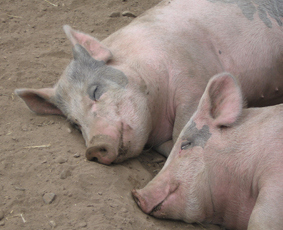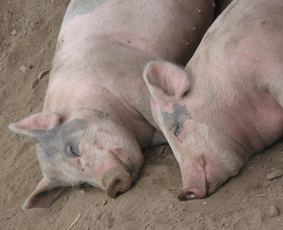Attributes like “poisonous,” “filthy,” or “wallowing in urine and excrement” sound suspiciously familiar.
So what have pigs, the most intelligent species among domesticated animals on earth, done to end up as pork? But whatever it was, it somehow hasn’t helped at all that they’ve been labeled “unclean” and unfit for consumption by the Tanakh, among humankind’s greatest and most influential compilations of fantasy stories, or by later publications from different branches of the same franchise as well.
So the pig’s lot’s been either to be eaten or to be despised.
Why would that be? Could it be a kind of paranoid reaction in human primates, related to some projective identification of the pig as a kind of mirror image, not of individuals but of the human condition? Following this line of thought, I quoted from Thomas Pynchon’s Gravity’s Rainbow in my blog entry On Pork, and mused about why our relationship with smart, social, domesticated animals is so incredibly different when it comes to either pigs or dogs in yet another blog entry, Pig Stories, Dog Stories, Our Stories. Moreover, there’s a quote attributed to Winston Churchill to that effect, and I always wondered what he meant by that:
Dogs look up to man. Cats look down to man. Pigs look us straight in the eye and see an equal.
Many commentators claim that the deeper meaning of this quote is that Winston Churchill liked pigs. Well, so do I. But that doesn’t add any explanatory power.
I can’t say much about the nutritional value of pork; at least it seems to be the case that it, even if lean, isn’t exactly the healthiest meat in terms of cholesterol and saturated fat, and there also seems to be some evidence, maybe entirely anecdotal, that its protein structure is similar to human flesh and thus hard to digest. But then again, beef is hard to digest too, and we’ve reached a level of civilization, over and above, where a livestock’s “original” properties are much less important than how it’s raised, fed, and genetically altered.
Taking the motif of the pig as a mirror image to the human condition, the Churchill quote, and the similarity between pork and human flesh (even if purely anecdotal), I have to restrain myself in order to not become very Freudian right here. But it always strikes me as very curious that the crazies out there from the religious and/or nutritional lunatic fringe who rant against the consumption of pork do so in terms that make it really hard not to. When pigs are described as “poisonous,” “filthy,” “wallowing in urine and excrement,” and many other attributes that also have been amazingly popular throughout human history regarding people’s respective enemies and all kinds of heretics, infidels, or blasphemists, then one begins to wonder: is the pig really simply a metaphor for certain kinds of human characteristics, preferentially those of others of course, or does the pig rather serve as a metonymic displacement, a reservoir for human characteristics we as a species have a hard time coming to terms with? Certainly, both seems to be the case, but the former could more plausibly be explained by the latter than vice versa.
 Happy Pigs I + II by Guénola Kahlert is licensed under a Creative Commons Attribution-Noncommercial 4.0 International License.
Happy Pigs I + II by Guénola Kahlert is licensed under a Creative Commons Attribution-Noncommercial 4.0 International License.
If you have something valuable to add or some interesting point to discuss, I’ll be looking forward to meeting you at Mastodon!


